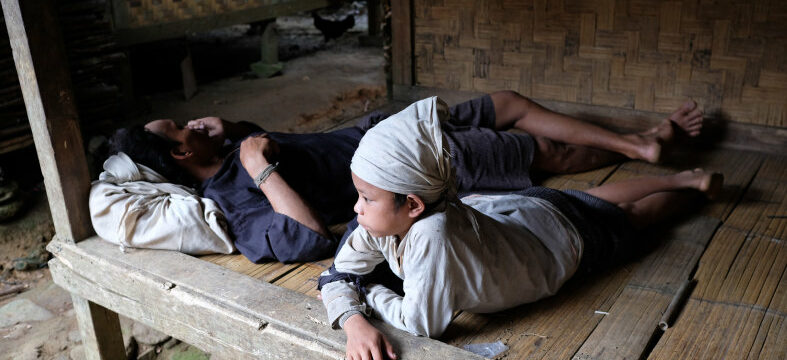Save articles for later
Add articles to your saved list and come back to them any time.
Singapore/Jakarta: The Indonesian government has agreed to consider facilitating a permanent online blackout in villages south-west of Jakarta after a request by their indigenous elders to switch off the internet to avoid its detrimental effects.
The Baduy tribe have maintained a simple existence for generations on the island of Java, largely spurning technology and a modern way of life.
A Baduy woman carrying handmade baskets walks out of one of the outer Baduy villages in Banten province.Credit: Getty Images
Now, as Indonesia and the rest of the globe becomes more connected, they are seeking to close themselves off from the online world.
The tribe, whose members live in Banten province, a three-hour drive from Jakarta, wrote to their district government in Lebak asking for there to be no reception in their villages.
In a letter, they requested “to eliminate internet signal or to divert the signal transmitter [tower] so that it is not directed to Baduy customary land from various directions, so that the Baduy customary land will be an area that is clean from internet signal”.
The objective, they wrote, was “limiting or closing down the negative applications, programs and content in the internet network that can influence the morals of [the] young generation”.
The Baduy have become a tourist attraction, with the Indonesian government building a village for visitors.Credit: Getty Images
Often referred to as the Amish of Asia, about 26,000 Baduy live in 68 villages across 4000 hectares of forest in central Banten, split between and an inner and outer sanctum.
The latter, where the vast majority live, has greater links outside the community and gadgets such as smartphones have been permitted to be owned and used there, while there is also a village for tourists built by the government to showcase the Baduy culture.
The three inner villages, collectively called Baduy Dalam, have limited outside contact.
Anik Sakinah, the head of communications for the Lebak district government, said on Wednesday it was unclear whether the Baduy elders wanted a deliberate internet blank spot in just Baduy Dalam or throughout the outer villages as well.
Villagers in Baduy.Credit: Getty
“We are waiting for a time to meet with Baduy customary council,” she said. “We want to have that meeting to get clarity.”
Sandiaga Uno, Indonesia’s Minister of Tourism and Creative Economy, said the government in Jakarta was also involved in responding to the Baduy.
“We have coordinated it and we are following up on the request conveyed by the community elders,” Uno said.
“Thee tourism village we developed is located outside the core Baduy area. The internet connectivity is still difficult, yet there has been no particular request [to block internet access there].“
Saija, a spokesman for the Baduy people who like many Indonesians goes by one name, told this masthead on Wednesday that elders were also unhappy about visitors going to the inner villages and taking photographs, violating a rule stating that they must not take cameras and phones in with them.
By cutting off the internet, the tribe’s customary council was attempting to “minimise the negative impact from the use of gadgets on our people”.
“The ease of access to information is also felt by the tribal society who should have guarded their ancestors’ tradition in accordance with the customary regulations. The existence of smartphones that can be possessed by all people including the Baduy tribe, is considered as causing moral degradation of our generation, [the ones] who are able to access various uneducated applications and contents that are not in line with the tradition,” the Baduy leaders said in their letter, which was first reported by AFP.
“We realise it is impossible to go against the advancement of time and we will follow and support the technology advancement … as long as it is not in conflict with the tradition. However, as a customary council we have to choose which products of advancement so they will not damage and harm our legal and cultural order.”
Get a note directly from our foreign correspondents on what’s making headlines around the world. Sign up for the weekly What in the World newsletter here.
Most Viewed in World
From our partners
Source: Read Full Article



